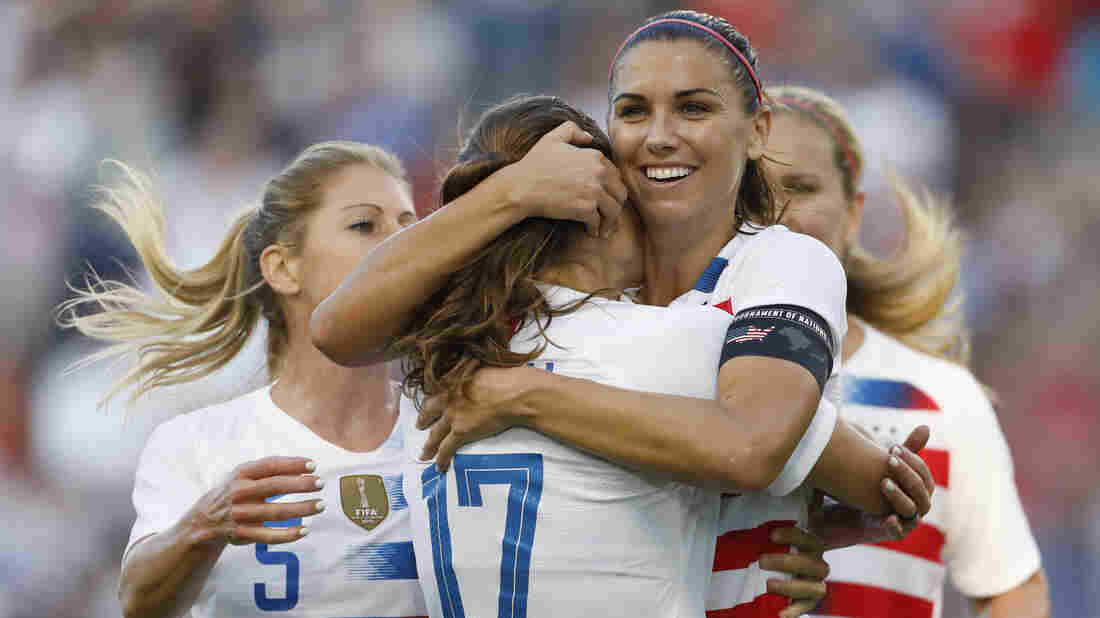SCOTT SIMON, HOST:
Despite the celebrated successes at the U.S. women’s team, soccer – or football, as they call it in most of the world – is seen as a man’s sport. In Berlin, an organization called Discover Football wants to embolden women athletes. As NPR’s Deborah Amos reports, eight teams gathered to lace up and speak out.
UNIDENTIFIED PERSON #1: (Cheering)
SIMON: For a decade now, Discover Football has connected women who have a passion to compete. More than a hundred women – coaches, referees, players – come from countries where apathy and downright hostility make it hard for women to come together to kick around a ball.
UNIDENTIFIED PERSON #1: Welcome to the opening ceremony of the 8th Discover Football Festival here in Berlin.
(APPLAUSE)
DEBORAH AMOS, BYLINE: They gather in Berlin to tackle problems on and off the field. For Sonia Slepcev and her team from Serbia, the challenge is to build talent early. But that means convincing young girls that soccer is for them.
SONIA SLEPCEV: We have a lot of stereotypes that women should not play football because it is all-male sports.
AMOS: She got her start playing neighborhood ball with boys. She joined a semi-professional women’s league before college. But she says the biggest barrier to women playing soccer is often women.
SLEPCEV: My friends from school – they were like, why do you play football? Are you a boy? Or – it’s hurtful, I think.
AMOS: The Iranian team came late. Their visas were delayed. But Iran now has a dozen national women’s soccer teams. And that’s progress, says Mahnaz Zokaee, an Iranian soccer referee. But still, the women’s matches aren’t allowed on Iranian TV.
MAHNAZ ZOKAEE: In Iran, we can just watch the men’s matches, not women match, you know? – but just follows in the Internet and, you know, in the Web.
AMOS: So you’re a crazy sports fan.
ZOKAEE: Yeah (laughter).
AMOS: She’s a big fan of the American women’s soccer team that won this year’s World Cup but no fan of American politics and the punishing economic sanctions imposed on her homeland by President Trump, which even touched her sport, she says, when she wasn’t allowed to wear her Nike gear as a professional referee in the 2018 Asian Games.
ZOKAEE: All of the Iranian referees are forbidden to wear the – Nike’s clothes in their international matches.
AMOS: What do you think about that?
ZOKAEE: I think it’s not fair. I think the sanction influenced it.
UNIDENTIFIED PERSON #2: Talk to each other, guys – communication.
AMOS: The theme of this festival is fair play, as the Iranian referee points out, a feature in sports but rarely in international politics. There are other links here to the political playing fields.
UNIDENTIFIED PERSON #3: (Chanting) Hello.
UNIDENTIFIED PLAYERS: (Chanting) Hi.
UNIDENTIFIED PERSON #3: (Chanting) Hello.
UNIDENTIFIED PLAYERS: (Chanting) Hi.
AMOS: This energetic team is called Players Without Borders. All of them are refugees in Berlin. Many are playing soccer for the very first time. It’s a milestone, says Dana Rosiger (ph). It’s why she’s worked for this organization for a decade. But she says women still have to speak out, like the American World Cup winners.
DANA ROSIGER: It was really good that America won this year because they have strong voices. And we need the strong voices. We still need to fight.
AMOS: It wasn’t until 1970 that the German Football Association lifted a ban on women’s soccer. And it took decades for the German team to catch up. The women’s team finally won the World Cup twice in 2003 and 2007. But despite the success, the German team still doesn’t get proper support, says Rosiger.
ROSIGER: Start with fair payments. Start with access to trainings. Most of the teams – they have a job besides to the – their football training.
AMOS: Restrictions that every player here has faced, which is why the bonds are so strong after a week on the field.
ROSIGER: Some are playing behind the doors or not visible at all until they get here – until they get here – and not to worry about what the consequences are.
AMOS: And here in Berlin, everybody plays to cheering fans, no matter the rules back home. Deborah Amos, NPR News, Berlin.
Copyright © 2019 NPR. All rights reserved. Visit our website terms of use and permissions pages at www.npr.org for further information.
NPR transcripts are created on a rush deadline by Verb8tm, Inc., an NPR contractor, and produced using a proprietary transcription process developed with NPR. This text may not be in its final form and may be updated or revised in the future. Accuracy and availability may vary. The authoritative record of NPR’s programming is the audio record.



